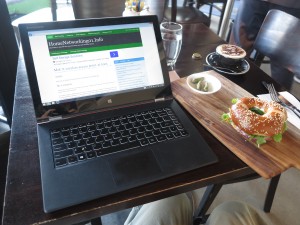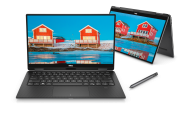Articles
Lenovo Refreshes Yoga Series with New Laptops and Tablets | Tom’s Guide
Lenovo’s New Yoga Laptop And Tablets Are All About Touch | Gizmodo
Lenovo Yoga Tablet 2 range
Lenovo Yoga Tablet 2 targets both Windows and Android | Mashable
Lenovo Announces 8- and 10-inch Yoga Tablet 2 for Windows and Android | Laptop Mag
Lenovo Yoga Tablet 2 Pro
Lenovo Yoga Tablet 2 Pro Wants to Be Your Tablet and Big Screen TV | Mashable
Lenovo Yoga 3 Pro
Lenovo Yoga 3 Pro is Thinner and Lighter with Adaptive Software | Laptop Mag
Lenovo ThinkPad Yoga 14
Lenovo ThinkPad Yoga 14 Makes Business Flexible | Laptop Mag
My Comments
There has been so much doubt in the concept of the convertible notebook but Lenovo is one of a few who are keeping it alive in the form of the Yoga lineup. This is a lineup of 360-degree convertible computers that fold over on their back to become either a laptop, tablet or something in between.
Recently, I reviewed the Lenovo Yoga 2 Pro and found that this 13” convertible was capable and able to do many different tasks, whether creating new written content, playing basic games, browsing the Web or watching video content. As well, Lenovo had run some “Yoga Tablets” which had a kickstand which worked in a similar way to how the Yoga laptops worked.
Lenovo has refreshed the Yoga Tablets by adding variants which are delivered with Windows 8.1. These use Intel Atom quad-core “classic microarchitecture” horsepower and work with 2Gb RAM. Their network connectivity is primarily the 802.11n Wi-Fi but some market-specific variants will come with 4G wireless broadband. Secondary storage is in the form of 16Gb SSD for Android variants or 32Gb SSD for Windows variants with add-on storage in the form of a microSD slot. They will come in the choice of an 8” or 10” screen for each operating system. One feature that Lenovo had integrated was a hole in the kickstand to allow it to hang from something like a cup hook in the kitchen.
They also fielded the Yoga Tablet 2 Pro which is the largest Android tablet, clocking in at 13.3”. This also has an integrated pico projector which can comfortably throw a 50” image and has an 8-watt sound system with an integrated bass driver, a feature being pitched at consumer or business use. But its hardware abilities are similar to the Yoga Tablet 2 which has the Atom processor working with 2Gb RAM, along with 32Gb SSD storage and add-on storage abilities courtesy of a microUSB “On The Go” port and a microSD card slot.
The Yoga 3 Pro has an aluminium chassis and a hinge similar to how a metal watchband is constructed. This is to make it easier to fold this 360-degree convertible between a tablet or a laptop or anything in between. It is slimmer than the Yoga 2 Pro and has that same 13.3” screen but the resolution clocks in at 3200×1800 pixels fulfilled by an integrated-graphics subsystem. It runs with Intel Core M-70 horsepower and can work with 8Gb RAM. As well, the maximum storage available is 256Gb SSD like the Yoga 2 Pro review sample along with a “4-in-one” memory card reader. There is the similar connectivity to the Yoga 2 Pro, including 2 USB 3.0 ports, a microHDMI port, a headphone/microphone audio jack as well as a power socket that can become a USB 2.0 port. It runs Windows 8.1 but also comes with Lenovo Harmony software that optimises it for the task in hand.
Business users who like the “work-home” laptop need not fret that they are being left out in the cold. This is because Lenovo have fielded the ThinkPad Yoga 14 which has the Yoga 360-degree convertible abilities but has the ThinkPad credentials like the excellent keyboard, thumbstick and a long battery life. This comes with a 14” Full-HD screen that is serviced with NVIDIA GeForce GTX840M discrete graphics. It has the latest generation Core i5 processor and can work with 8Gb RAM. For secondary storage, it comes with a 1Tb hard disk and has most of the same connectivity as the Yoga 3 Pro, except for a full-size HDMI port.
What I see of this is that Lenovo won’t give up easily on the convertible notebook computer even though a lot of naysayers are running the line that the computing world is just tablets, especially the iPad.


